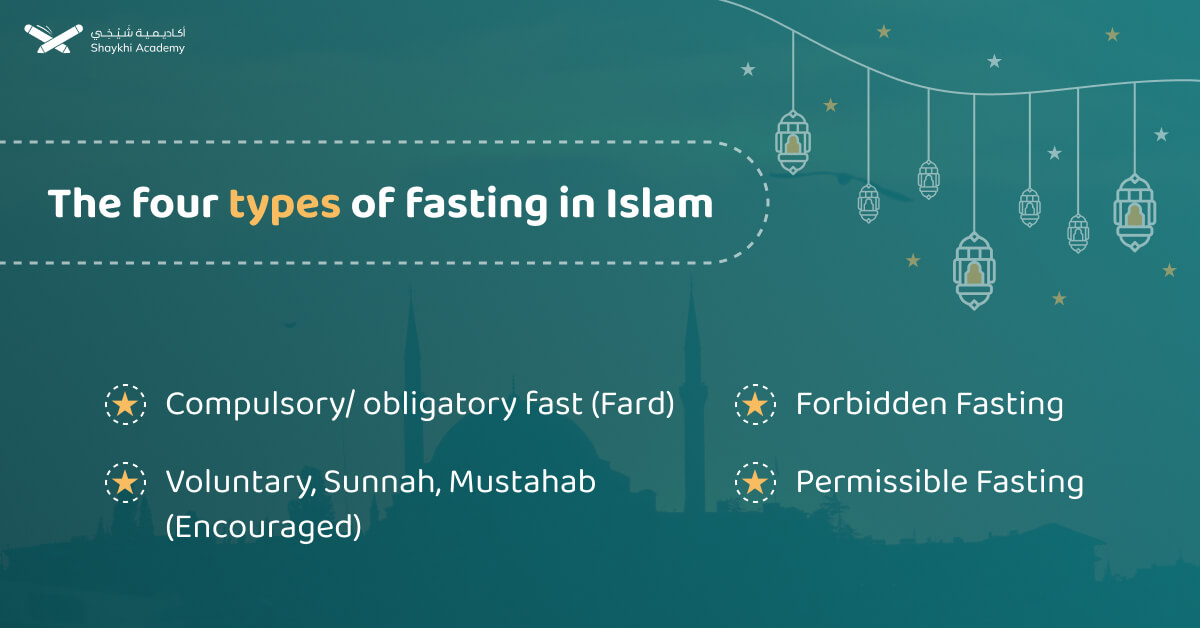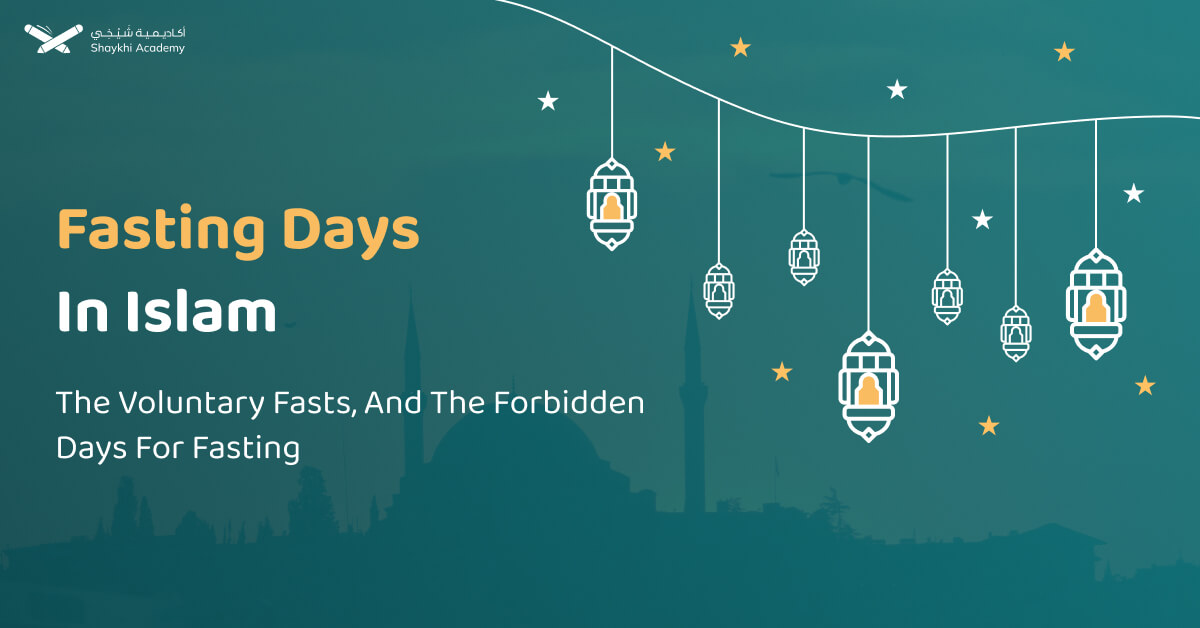Fasting Days In Islam are various. fasting encompasses various types: compulsory (Fard), voluntary (Sunnah/Mustahab), forbidden, and permissible. The most significant fasting period is during Ramadan, where abstaining from food, drink, and sexual activity from dawn to sunset is obligatory for eligible individuals.
Voluntary fasts include those during Shawwal, Mondays and Thursdays, the middle days of the lunar month, the sacred months, the day of Arafah, and the fasting practice of Prophet Dawud (peace be upon him).
Certain days are forbidden for fasting, such as Eid al-Fitr and the days of Tashreeq. Additionally, it’s discouraged to fast on the day of doubt and to fast consecutively without breaking the fast (Wisal). Singling out Friday or Saturday for voluntary fasting is also not permitted, except for those accustomed to fasting alternate days. Moreover, it’s impermissible for a married woman to fast voluntarily without her husband’s permission.
Permissible fasting refers to fasting on non-specific days for voluntary worship, such as fasting on Tuesdays, Wednesdays, or any other day throughout the year. Fasting in Islam serves as a means of spiritual growth, self-discipline, and a deeper connection with Allah.
Fasting is one of the most important acts of worship, it is considered one of the five fundamental pillars of Islam. Fasting is only compulsory during Ramadan, the ninth month of the Hijri year. However, Muslims are encouraged to fast on many other occasions throughout the year. Let’s discuss everything about fasting days in Islam and when fasting is considered compulsory, recommended,or forbidden.
Fasting Days in Islam
Fasting is the act of worship in which Muslims are required to strictly refrain from eating, drinking, and sexual activity from dawn until sunset. Fasting in Islam may be compulsory, recommended or forbidden. This depends on the timing of fasting in the Hijri calendar.
Let us explore the fasting days in Islam, and take a closer look at the wisdom behind fasting these days.
The four types of fasting in Islam
Fasting is in Islam falls under one of four categories that can be summarized as follows:
- Compulsory/ obligatory fast (Fard)
- Voluntary, Sunnah, Mustahab (Encouraged)
- Forbidden Fasting
- Permissible Fasting

Compulsory Fasts in Islam
The only time in which fasting is considered compulsory in Islam during the month of Ramadan, which is the ninth month in the lunar year. Ramadan is either 29 or 30 days depending on the moon sightings.
Fasting Ramadan is a compulsory act of worship for persons who fulfill five conditions which are: Being a Muslim, accountability (mukallaf), ability, settling (not traveling), and absence of impediments to fasting )such as menstruation and postpartum bleeding in females).
It is also mandatory (Wajib) for Muslims to make up for the days they missed during Ramadan when they are able to at any time after the holy month.
Voluntary Fasts in Islam (Mustahab/ Encouraged)
Voluntary fasts are additional days in which Muslims fast on different occasions throughout the year to achieve Allah’s pleasure and forgiveness and gain their great rewards by following the footsteps of the prophet Muhammad peace and blessings be upon him. Here are some examples of voluntary fasts in Islam.
Fasting the six days of Shawwal
Upon completion of the fast of Ramadan, it is Sunnah to fast six days during the month of Shawwal.
Fasting six days of Shawwal has a great reward. Whoever fasts Ramadan and then fasts six days of Shawwal will be rewarded as if he fasted a whole year.
As narrated by Abu Aiyub Al-Ansari that The Messenger of Allah said:
“Whoever fasts during the month of Ramadan and then follows it with six days of Shawwal will be (rewarded) as if he had fasted the entire year.”
Related by Muslim.
Fasting on Mondays and Thursdays
Muslims are encouraged to fast voluntarily on Mondays and Thursdays. There are many Hadiths that emphasize the rewards of fasting these two days such as the Hadith narrated by Abu Hurairah that: the Messenger of Allah said:
“Deeds are presented on Monday and Thursday, and I love that my deeds be presented while I am fasting.”
(Jami` at-Tirmidhi 747)
Fasting on the three lunar days of every Hijri month
Prophet Muhammad peace and blessings be upon him used to fast the three middle days of the lunar month. These days are The 13th, 14th, and 15th of the Hijri month also known as the bright days or “Al-Ayam-AlBeed” referring to the complete moon phase that lights the nights of these days.
It was narrated that Ibn ‘Abbas said:
“The Messenger of Allah would not break fast on the days of Al-Bid whether he was a resident or traveling.”
(Sunan an-Nasa’i 2345)
Fasting on the 10th of Al-Muharram
Narrated Aisha:
Quraish used to fast on the day of ‘Ashura’ in the Pre-Islamic period, and Allah’s Messenger too, used to fast on that day. When he came to Medina, he fasted on that day and ordered others to fast, too. Later when the fasting of the month of Ramadan was prescribed, he gave up fasting on the day of ‘Ashura’ and it became optional for one to fast on it or not.
(Sahih al-Bukhari 2002)
Prophet Muhammed fasted the tenth of Muharram and intended to fast the ninth and tenth the next year. But he (peace and blessings be upon him) died before he could do so. Therefore it is recommended to fast on the 10th day of Al-Muharram in addition to a day before or a day after.
Fasting most of Shaaban
It is recommended (Mustahab) to fast most of the days of Shaaban since it was narrated that the prophet Muhammad peace and blessings be upon him used to fast nearly all of Shaaban.
It was narrated from Jubair bin Nufair that a man asked Aishah about fasting and she said: “The Messenger of Allah used to fast all of Shaban, and he made sure to fast on Mondays and Thursdays.” (Sunan an-Nasa’i 2186)
Fasting during the “sacred” months (Al-Ashhur Al-Hurum)
The Hijri calendar consists of 12 months four of which are called the secret month or an asshole and held him these months are Dhul-Qa’dah, Dhi Al-Hijjah and Muharram in addition to Rajab
During these four months, rewards for good deeds are doubled. Hence, Muslims are generally encouraged to increase their acts of worship which include fasting.
It was narrated that Abu Hurairah said:
“A man came to the Prophet (ﷺ) and said: ‘Which fasting is better after the month of Ramadan?’ He said: ‘The month of Allah which is called Muharram.’”
(Sunan Ibn Majah 1742)
Fasting the day of Arafah
Abu Qatadah Al-Ansari narrated, ‘The Messenger of Allah was asked about fasting on the day of Arafah (the 9th of the month of Dhul Hijjah). He replied, “Fasting on the day of Arafah is an expiation for the preceding year and the following year.” He was also asked about fasting on the day of Ashura (the 10th of the month of Muharram).
He replied:
“Fasting on the day of Ashura is an expiation for the preceding year.” The Messenger of Allah was also asked about fasting on Monday, and he replied, “This is the day on which I was born and the day on which I was sent (with the Message of Islam) and the day on which I received revelation.”
Related by Muslim.
The Fasting of Prophet Dawud
Abdullah bin ‘Amr (May Allah be pleased with them) reported: The Messenger of Allah said, “The Salat which is dearest to Allah is that of (Prophet) Dawud; and As-Saum (the fasting) which is dearest to Allah is that of (Prophet) Dawud. He used to sleep half the night, get up to perform Salat for one-third of it, then sleep through the remaining one-sixth of it; and he used to observe Saum on alternative days.” [Al-Bukhari and Muslim].
Which Are the Forbidden Days For Fasting in Islam?
Although fasting is one of the most rewarding worships in Islam there are some days that Muslims are forbidden to fast on. Here are some of these days in addition to some fasting practices that are not allowed for Muslims.
Fasting on The first day of the Feast (Eid)
It is prohibited to fast on the day of al-fitr, which is the day following Ramadan or the first day of Shawwal. However, it is permissible to fast on the second and third days of Shawwal either to make up for missed Ramadan fast or voluntary fasting.
As for Eid Al-Adha, it is prohibited to fast on Al-Nahr day, or the first day of Eid Al-Adha which coincides with the 10th day of Dhu-Al Hijjah. And the same applies for the three days that follow which are called Al-Tashreeq days.
It was narrated from Abu Sa’eed that:
The Messenger of Allah forbade fasting on the Day of Fitr and the Day of Adha.
(Sunan Ibn Majah 1721)
Fasting on the Days of Tashreeq
Days of the Tashreeq are the three days following the first day of Al-Adha feast On these days is forbidden according to the hadith reported by Nubaisha al-Hudhali that Allah’s Messenger said:
The days of Tashriq are the days of eating and drinking.
(Sahih Muslim 1141a)
Fasting The Day of Doubt
It is not allowed to fast the day of doubt which is the last day of Shaban, when there is doubt if it is the last day of Shaban or the first day of Ramadan. As prophet Muhammad peace and blessings be upon him ordered us to fast when we see the crescent moon and break the fast when we see the crescent moon. This means that in case the moon of Ramadan was not clearly seen, we should consider Shaban as 30 days.
It was narrated that Silah bin Zufar said:
“We were with ‘Ammar on the day concerning which there was some doubt. A (roasted) sheep was brought and some of the people moved away. ‘Ammar said: ‘Whoever is fasting on this day has disobeyed Abu Qasim.’”
(Sunan Ibn Majah 1645)
Additionally, it was narrated that Abu Hurairah said:
“The Messenger of Allah (ﷺ) forbade anticipating the fast by fasting one day before sighting (of the crescent).”
(Sunan Ibn Majah 1646)
Singling Friday or Saturday with Fasting
Singling out Friday or Saturday with a voluntary fast is not permissible Unless someone is already used to fasting Alternate days which is known as fasting of prophet Dawood peace and blessings be upon him.
However, it is permitted to fast on Friday or Saturday for mandatory fasting such as making up for missed Ramadan days or fulfilling a vow or expiations.
Fasting consecutively without breaking the fast (Wisal)
One of the fundamentals of Islam and the major aims of Islamic legislation is the preservation of self. Hence, it is forbidden to commit an act that causes harm to oneself, such as fasting for consecutive days without breaking the fast.
This can be understood through the Hadith narrated by Abu Hurairah, that the Messenger of Allah forbade us from practicing wisal in fasting (i.e. fasting continuously without breaking one’s fast in the evening or eating before the following dawn).
So a man said to him, ‘But you practice wisal O Messenger of Allah!’ The Prophet Allah replied, “Which one of you is like me? I am given food and drink during my sleep by Allah.” So when people refused to stop wisal, the Prophet fasted day and night continuously along with them for a day and then another day and then they saw the crescent (of the new month of Shawwal). The Prophet said to them, “If the crescent had not appeared, I would have made you fast for a longer period.” That was a punishment for them because they refused to stop (practicing Wisal). (Agreed upon)
Fasting of a Female voluntarily without the permission of her husband
In Islam, the rights of a husband to his wife are prioritized over doing voluntary acts of worship. Hence, it is not permissible for a married Muslim woman to voluntarily fast when her husband is present without taking his permission.
As reported by Abu Huraira that God’s messenger said, “It is not allowable for a woman to fast when her husband is present without his permission,* and she may not allow anyone to enter his house without his permission.” This does not refer to Ramadan but to voluntary fasts. (Muslim transmitted it)
Permissible Fasting Days in Islam
Muslims are generally encouraged to fast. Permissible fasting in Islam means the non-specific days when Muslims can fast such as fasting on Tuesdays, Wednesdays or any other day throughout the year.
Learn Quran, Arabic, and Islamic Studies Online Witn Native Arab Tutors!
Discover the richness of Islam with our comprehensive Islamic studies courses, taught by native Arab tutors. Dive deep into Quranic education, Arabic language, and various aspects of Islamic studies. Experience up to two free trial sessions to explore our offerings before making your decision. Start your journey of learning now!
Why Choose Shaykhi Academy?
- Connect with highly qualified native tutors.
- Flexible scheduling to suit your busy lifestyle.
- Affordable classes tailored for all levels.
- Accessible from anywhere around the globe.
Discover Our Range of Courses:
- Arabic Noorani Qaida: Lay a solid foundation for Quranic studies.
- Online Quran Classes for Kids: Engaging lessons for lifelong learning.
- Tajweed Rules for Kids: Learn to recite with confidence.
- Quran Hifz for Kids: Step-by-step guidance to memorize the Quran.
- Quran for Adults: Introduce yourself to Quran reading and Tajweed rules.
- Online Arabic Courses: Master the language of the Quran.
- Islamic Studies: A wide range of topics related to Islam, including theology, law, Quranic studies, Hadith.
Don’t Miss Out on Your Chance to Excel!
Whether you’re a beginner or seeking advanced knowledge, Shaykhi Academy can guide you! Book your free trial now and make Ramadan 2024 your Quranic turning point!
Summary
Fasting days in Islam are numerous. Most of these days represent important historical events and significant Islamic occasions. While some of these fasting days are compulsory, others are optional. However, there are some days in which fasting is absolutely forbidden for Muslims. In all cases, pious Muslims should obey the orders of Allah Subhanahu wa Ta’ala and follow the Sunnah of Prophet Muhammad Peace and blessings be upon him in order to achieve Allah’s pleasure and rewards in this world and the hereafter.
Compulsory fasting during Ramadan is a fundamental pillar of Islam, while voluntary fasts offer additional opportunities for spiritual growth and reward. However, certain days are designated as forbidden for fasting, emphasizing the importance of adhering to Islamic guidelines. Through fasting, Muslims deepen their connection with Allah and strengthen their faith, embodying the principles of self-discipline and devotion in their religious practice.




















